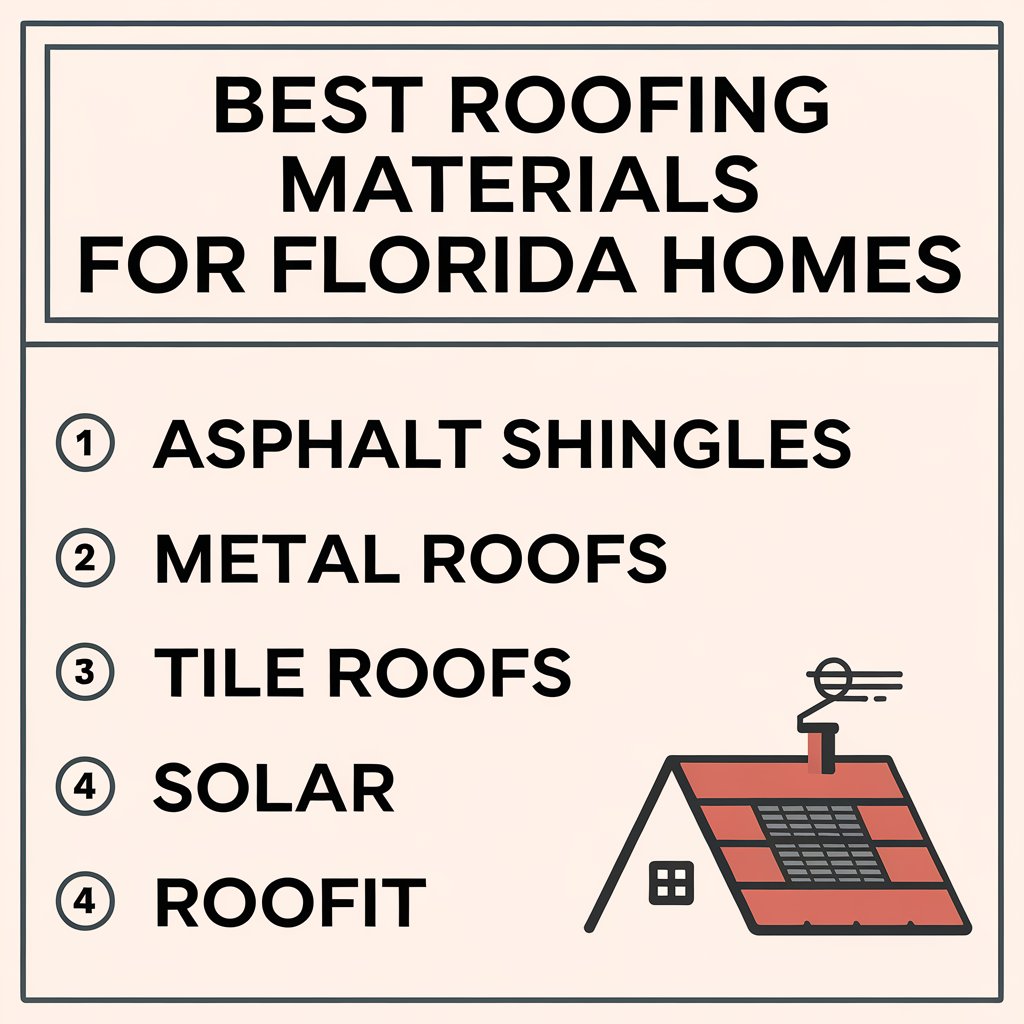Top Roofing Materials for Florida Homes: A Complete Guide to Making the Right Choice

Choosing the right roofing material is critical for homeowners in Florida. Florida’s weather includes high heat, humidity, and hurricanes, so roofs MUST be durable and protective. This guide from Thomas Roofing of Central Florida explains the Best Roofing Materials for Florida Homes, providing clear and actionable information that residents can follow..
Factors to Consider When Selecting Roofing Materials
- Weather and Climate
Florida’s hot climate and frequent storms mean roofing materials must resist heat, heavy rain, and strong winds. Durability is essential. - Energy Efficiency
Florida’s heat can raise energy bills. Materials like metal roofs or cool roofs can reduce heat absorption, keeping homes cooler and lowering energy costs. - Maintenance and Longevity
A roof’s lifespan depends on its material and upkeep. Regular inspections and maintenance help maximize durability and efficiency.
More Reading: The Benefits Of Professional Roof Installation
Top Roofing Materials for Florida Homes
1. Asphalt Shingles
- Benefits: Affordable and versatile.
- Weather Resistance: Moderate durability; may need reinforcement in hurricane-prone areas.
- Energy Features: Reflective coatings are available to reduce heat absorption.
- Care: Regular inspections help prevent wear.
2. Metal Roofing
- Benefits: Long-lasting, lightweight, and energy-efficient.
- Weather Resistance: Resists high winds, rain, and extreme heat.
- Energy Features: Reflects sunlight, reducing cooling costs.
- Care: Minimal maintenance; lifespan can reach 50 years.
3. Tile Roofing (Clay or Concrete)
- Benefits: Combines durability with aesthetic appeal, ideal for Mediterranean-style homes.
- Weather Resistance: Handles hurricanes and high winds well.
- Energy Features: Naturally insulates to reduce heat.
- Care: Cracked tiles require prompt repair to prevent leaks.
4. Slate Roofing
- Benefits: Classic design and extended lifespan.
- Weather Resistance: Fire-resistant and durable against heat and rain.
- Energy Features: Provides insulation to reduce energy costs.
- Care: Requires sturdy roof structure for support; higher upfront cost.
5. Flat Roofs with Cool Roofing Options
- Benefits: Cost-effective and suits modern designs.
- Weather Resistance: Best for areas with less wind exposure; waterproofing is essential.
- Energy Features: Cool coatings reflect sunlight to lower heat absorption.
- Care: Regular sealing is necessary to prevent leaks.
6. Solar Roof Tiles
- Benefits: Combines roofing with energy generation.
- Weather Resistance: Built to handle extreme conditions.
- Energy Features: Provides renewable energy, cutting energy bills.
- Care: Specialized maintenance required for optimal performance.
Tips for Choosing the Right Roofing Material
- Consider Your Location
Homes near the coast may need metal or concrete tiles to resist salt air and high winds. - Focus on Energy Costs
Choose energy-efficient materials like metal roofing or solar tiles to save on cooling expenses. - Match Your Home’s Style
Materials like clay tiles or slate complement specific architectural designs. - Hire a Florida Contractor
Florida contractors like Thomas Roofing of Central Florida understand local weather and building codes, ensuring proper installation. - Plan Your Budget
Consider upfront costs and long-term savings. Durable materials may cost more initially but save money over time.
Return to Roof Installation Page
Start your roofing project with Thomas Roofing of Central Florida. Our company specializes in Florida’s unique climate and will recommend the best roofing material for your home. Call us today at (352) 625-7663 for expert advice and a free estimate!
FAQs on Choosing the Best Roofing Materials for Florida Homes
- What roofing materials are best for hurricane-prone areas in Florida?
Metal roofing and concrete tiles are excellent choices. They are durable, resistant to strong winds, and meet Florida’s building codes for hurricane-prone areas. - How can I reduce energy costs with my roof in Florida?
Energy-efficient options like metal roofs, cool roof coatings, or solar tiles reflect sunlight and reduce heat absorption, lowering cooling costs. - Are asphalt shingles suitable for Florida’s climate?
Asphalt shingles can work well in many areas but may require reinforcement in hurricane zones. Reflective shingles are a good option to improve energy efficiency. - How often should I inspect my roof in Florida?
Regular inspections every six months and after storms help identify damage and extend your roof’s lifespan. Proper maintenance is key in Florida’s harsh climate. - What is the average lifespan of a roof in Florida?
The lifespan depends on the material:- Asphalt shingles: 15–20 years
- Metal roofs: 40–50 years
- Tile roofs: 50+ years with proper care
Regular maintenance and inspections can extend these timeframes.
Return to the Homepage
